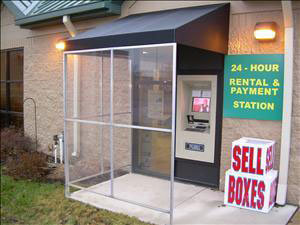Self-storage owners nationwide are holding on in this tight economy, but to do so is no small feat. Infinite Self Storage is one clear example of how a company can thrive in a downturn. In a world filled with automation and consumers who want what they want when they want it, Steve Lavery, vice president of property management at Herman and Kittle Properties, knew something had to change to keep business booming.
Meeting Consumer Demand
A subsidiary of Herman and Kittle, Infinite Self Storage is comprised of 23 properties throughout Illinois and Indiana. From its headquarters in Indianapolis, the company operates more than 1.2 million square feet of storage space and more than 6,400 apartment homes in six states.
In 2007, Infinite began to change the face of its business, creating greater coverage and meeting the demands of a customer base that wants 24/7 service. The first step was installing four self-service kiosks to allow customers to rent units and make payments on their own schedule. When those kiosks rented 40 units in the first three months of operation, the management team became believers.
 In 2008, the company installed 19 more kiosks and, in 2009, it signed up for a call-center service to take advantage of two key services. First, the call center pushed all calls not answered at a facility to a call-center agent who could give the caller information or make a reservation. Next, the agent directed the customer to the kiosk and walked him through the entire rental process, making the sale complete.
In 2008, the company installed 19 more kiosks and, in 2009, it signed up for a call-center service to take advantage of two key services. First, the call center pushed all calls not answered at a facility to a call-center agent who could give the caller information or make a reservation. Next, the agent directed the customer to the kiosk and walked him through the entire rental process, making the sale complete.
Lavery worried some customers might want a “human” touch when renting units and processing payments, but that concern was alleviated with the call-center service. Customers can push a button on the kiosk to be connected to a agent who can help with questions ranging from, “Will my stuff fit in a 10-by-10?” to “How do I process my payment through the kiosk?”
Infinite also considered the potential security issues of granting immediate access to customers who rent using the kiosk. Security cameras are in place and management has knowledge of customers accessing units based on gate code.
Risks and Rewards
 Moving to more automation was a risk, Lavery says, because the company didn’t know what kind of traffic, if any, the kiosk or call center would generate. However, they did know their customers wanted access to service 24/7. “We are a society of convenience, and our customers need it. If we didn’t offer that to them, someone else surely would,” Lavery says. “It takes a lot of courage to make that leap and a strong sense to know that it will work.”
Moving to more automation was a risk, Lavery says, because the company didn’t know what kind of traffic, if any, the kiosk or call center would generate. However, they did know their customers wanted access to service 24/7. “We are a society of convenience, and our customers need it. If we didn’t offer that to them, someone else surely would,” Lavery says. “It takes a lot of courage to make that leap and a strong sense to know that it will work.”
In assessing the risks and rewards, Lavery calculated that if each store generated two kiosk sales per month, the units would pay for themselves. On average, the kiosks are generating six sales per month, tripling Lavery’s expectations and providing a clear sign that customers are responding to the technology.
With confirmation of results, Infinite eliminated the assistant-manager position from its organizational structure, saving $200,000 annually. “We’re getting 100 hours of coverage per month with the call center for about a dollar an hour,” Lavery says.
He believes there are four crucial components to making this model work. The first is an Internet presence that lets customers know you are open 24 hours, seven days a week. This helps drive traffic to your facility. Next is a kiosk that allows customers to rent and make payments at their convenience. The third component is the call center, which enables managers to focus on marketing. And last, but still a crucial key to success, is marketing your services in the community.
A New Kind of Manager
Infinite Self Storage now recruits a different type of manager. “I need someone who can go out into the community and market our services and what we have to offer,” Lavery says. “I challenge my managers on their occupancy rates and then hold them accountable for results.”
Lavery’s team leaders spend anywhere from two to four weeks training new store managers. It’s a well-defined program that teaches a variety of skills including marketing and sales calls. Infinite’s managers all use Blackberries and have access to facility information via their home computers.
Infinite is currently testing two operational models: one manager running two stores, and one manager running three stores. The first model has been going strong since it began in November and has allowed Infinite to realize savings of approximately $35,000. The second model was initiated in February 2010, so it’s too early in the process to make a determination on gains.
Lavery indicated that one small downside to this model is the toll it can take on employee engagement. “Initially, our managers had a lot of resistance to this type of model and the technology that goes with it,” he says.
To engage managers, Infinite has offered a variety of incentives. The company hosts monthly contests and gives gifts for the best performing stores. Lavery prints a weekly report card and posts a competitive ranking to help his team stay on their toes. “We focus on fun and driving sales, and it’s working.”
What’s Next
With the kiosks now handling 35 percent of new sales, Lavery and his team have time to market their facilities in the community while attending to employee engagement. They also have time to think about what’s next.
Ideas range from automated accounts receivable to systems that use voicemails and e-mails to contact customers regarding their accounts. Lavery estimates 40 percent of his customers list an e-mail address as a method for contact. “It’s just another sign that people are embracing technology and prefer it,” he says.
Additionally, Lavery indicated that Infinite knows this technology template will work, and feels the company can experience success on the acquisition side of the business using this model. When implementing a model like this, Lavery recommends self-storage owners reach out to operators who are already embracing technology.
Infinite Self Storage is not only holding steadfast in a tough economy but experiencing growth and increased revenue. The company’s willingness to invest in technology and evolve its property-management model to meet customer demands has been very rewarding.
Mandy Welborn is the marketing manager for OpenTech Alliance Inc., maker of the INSOMNIAC® line of self-storage kiosks. For more information, call 602.749.9370; e-mail mwelborn@opentechalliance.com, visit www.opentechalliance.com.
Press Contact:
Marketing
(602) 749-9370
Marketing@opentechalliance.com
NOTE TO EDITORS: OpenTech Alliance, the OpenTech logo and INSOMNIAC are trademarks of OpenTech Alliance, Inc. Other company and product names may be trademarks of their respective owners. INSOMNIAC is protected by U.S. patent number 5,946,660.









